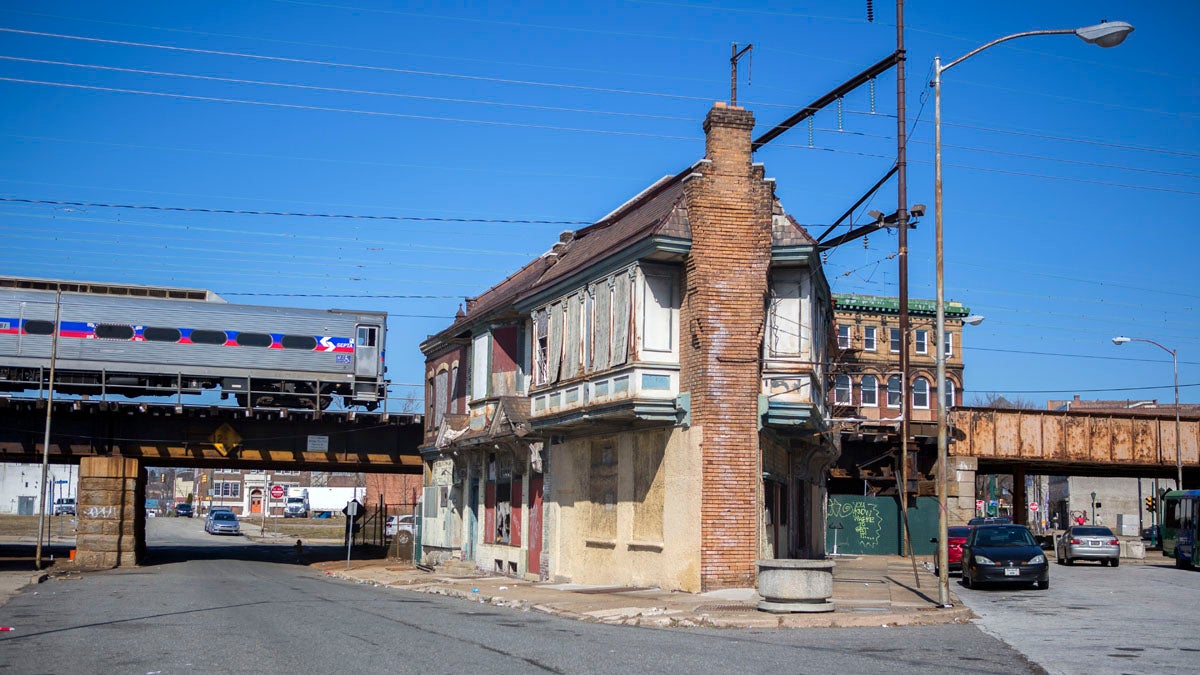In case you missed it: This week’s best reads from Pennsylvania cities

A group of investors have been trying to restore one of the oddest shaped buildings in downtown Chester. Find this story and others on the new podcast
Chester, education, and never, ever enough money to go around.
Spotlight on: Chester
Chester, the DelCo city of 35,000, got the full Grapple treatment this week in the latest episode of our new podcast. Chester could be seen as a drive-by city, situated along I-95 between Philadelphia and Wilmington. But it’s a city full of residents (though not as many as before), stories, and serious change.
Yale sociologist Elijah Anderson spent some time in Chester in the 1970s. He was a professor at Swarthmore and found Chester an interesting place to conduct ethnographic research. In episode four of Grapple, he reflects on how the city has evolved.
Chester is in Act 47, the state’s program for distressed cities. They recently passed an amended recovery plan, after much heated debate about cuts to services like fire and police. Chester has the highest murder rate in the state, and is participating in a voluntary overhaul of policing practices overseen by the U.S. Department of Justice. They’re also facing a potential loss of casino funds, thanks to a new state regulation that would limit how much the city brings in from Harrah’s Philadelphia.
All of which is to say, they’re grappling with some major issues. Meet some of the residents, change-makers, and big thinkers that are part of that process on this week’s episode of Grapple.
A day late and a dollar short
If you can name one city in Pennsylvania that says it has enough money to do everything it wants to do, I’ll give you a dollar. Heck, let’s expand it out to the whole United States, and make it $10. No one has enough money to get everything done.
But some cities make it tougher on themselves. Harrisburg, for example, ended up in a pile of debt after an incinerator deal gone bad. Now, Pennsylvania has passed a series of laws that will increase accountability when public officials take out debt on behalf of taxpayers. There will also be closer monitoring of potentially risky financial deals.
Or Philadelphia, which is nearly half a billion dollars short on property tax. They’re considering going after delinquent tax payers more formally — and more aggressively.
Meanwhile, Reading is moving in the other direction.
No longer will residents be incarcerated over unpaid parking tickets. Cars will still be booted and the fees will still need to be paid, but the 15,000 tickets in the criminal system will be moved into the Reading Parking Authority’s civil system. The city is also considering lowering penalties for residents caught with marijuana.
One chronically underfunded department, in every county, is the Office of the Public Defender. Pennsylvania is the only state that funds public defenders at the county level, which leads to disparities in funding levels. But a recent ruling by the Pennsylvania Supreme Court gives criminal defendants a chance to intervene before their trial if they think an underfunded department won’t be able to offer them adequate defense.
Speaking of not enough money — education funding
As we’ve reported, Pennsylvania is trying to figure out the best way to fairly fund education. The old, “hold-harmless” formula isn’t seen as fair by districts that have seen enrollment grow. But some advocates argue that the new fair funding model doesn’t go far enough.
For advocates, legislators and educators, this is a really hot-button issue. We brought a group of about 40 experts together to talk about these challenges, and gathered their takeaways and Tweets in one place for your enjoyment.
We also spoke to the other important stakeholders in all this, who don’t always get top billing: parents. Whether their child’s school is well-funded or under-resourced, parents want the same things, and face the same concerns: “equality, safety, learning and preparation for their children’s future.”
Popping up and shutting down
Have you ever experienced the joys of a pop-up park? It’s like a normal park, but only there for a short period of time. These temporary, low-cost interventions can be a great way to get the community involved in thinking about revitalizing their space without waiting for the city to get involved.
Other things that are disappearing: newspapers. After 200 years of being a two-paper town, Pittsburgh is scaling down. The Pittsburgh Tribune-Review is going to stop publishing the print edition in the city and focus on online content. The Pittsburgh Post-Gazette is still going strong, though, if you need something to line your birdcage after you read the news.
WHYY is your source for fact-based, in-depth journalism and information. As a nonprofit organization, we rely on financial support from readers like you. Please give today.

